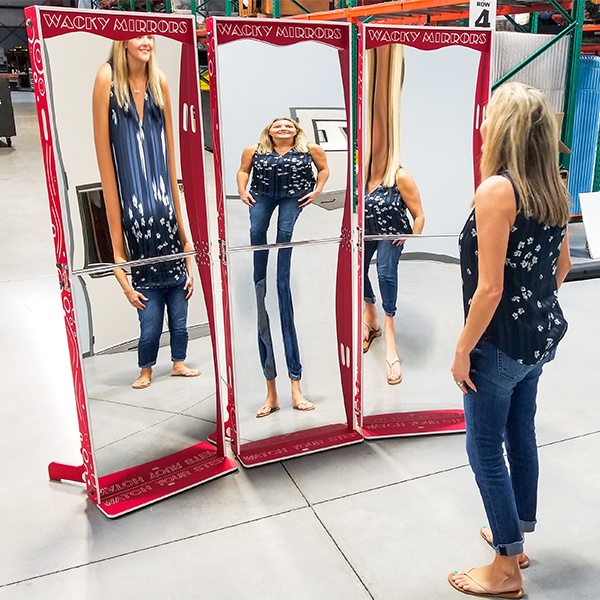
To listen to this reflection as a podcast, click here.
Every day during this season of Lent we’re looking at one of the “3:16” verses of the Bible, spotlighting some of the significant theological statements that happen to fall on the 16th verse of the third chapter of a number of Old and New Testament books.
“But whenever anyone turns to the Lord, the veil is taken away.” (2 Corinthians 3:16)
Funhouse mirrors are fun.
An American inventor named Charles Frances Ritchel (1844-1911) is thought to be the first person to experiment with full-length mirrors. By warping a mirror’s typically flat surface into a series of concave or convex waves, tall people may appear to be short. Thin people might look a mile wide. Funhouse mirrors distort arms, legs, heads, and hips, so that any of us might suddenly look like a creature who slithered off a flying saucer in a third-rate science fiction movie.
It’s all in fun, of course. But no one wants to go through life wondering if what they’re seeing day by day is an illusion or the real thing.
That’s where Paul takes his readers in the third chapter of 2 Corinthians.
He references an interesting reality from the life of Moses. According to Exodus 34:33-35, Moses was occasionally given the privilege of face-to-face meetings with God. These unprecedented conversations changed his physical appearance. When he emerged from an audience with Yahweh, his face was shimmering with the reflected glory of God.
His fellow Israelites were terrified. We might imagine our own response if we were told that someone was glowing with radioactivity. As a courtesy – and perhaps as an act of mercy – Moses covered his face with a veil.
As a way of making the case that following Jesus is a superior experience to anything previously available in Judaism, Paul declares that the veil covering Moses’ face – the one that used to prevent ordinary people from seeing God’s glory – is still there. But now it’s covering people’s hearts (3:15). People can’t see God’s glory, and who God really is, because something is obscuring their spiritual vision.
Which brings us to 2 Corinthians 3:16: “But whenever anyone turns to the Lord, the veil is taken away.”
Or we can put it this way. Until we abandon ourselves to Jesus, we’re not seeing things as they really are. We’re looking at a warped surface that distorts our hopes, our prayers, and the way we look at God and each other.
Years ago a woman who belonged to our church came to visit me at the office. She was an earnest student of Scripture, and had noticed the Old Testament’s strong emphasis on keeping the Sabbath. She had decided to honor God on the seventh day of the week (Saturday) exactly as the Torah prescribes, and wondered why our church had dropped the ball by designating Sunday as our time of worship.
I gently pointed out that the New Testament provides freedom of conscience on such questions (see Romans 14:5-9). But she was adamant: “How can we just ignore what the Bible says with such clarity?” I greatly admired her spiritual resolve. But God is no longer asking his people to shape their lives in precisely the same ways he did in the days of Moses.
When we look at a restaurant menu, for example, we no longer have to overlook shrimp and pork. We’re no longer called to live outdoors for a week in homemade shelters during the Festival of Booths. We no longer have to sacrifice young lambs in the search for personal forgiveness.
What happened? Jesus happened.
Followers of Jesus love the Jewish Scriptures of the Old Testament. But we read them in light of the New Testament – not the other way around. Removing the veil means that we see the psalms, the prophets, the commands of the Torah, and the history of ancient Israel through “Jesus-colored glasses.” Bible scholar Dale Bruner puts it well: “The OT and NT sing a duet, but the NT carries the melody.”
That means we always examine life’s most important questions in light of what we read in the New Testament, not just what happens to inspire us in the Old.
Paul goes on to say in 2 Corinthians 3:18 that as followers of Jesus we actually get to have our own Mosaic experience. We “reflect the Lord’s glory with unveiled faces.” It’s worth reading Eugene Peterson’s rendering of verses 16 through 18 in his paraphrase called The Message:
“Whenever, though, they turn to face God as Moses did, God removes the veil and there they are—face-to-face! They suddenly recognize that God is a living, personal presence, not a piece of chiseled stone. And when God is personally present, a living Spirit, that old, constricting legislation is recognized as obsolete. We’re free of it! All of us! Nothing between us and God, our faces shining with the brightness of his face. And so we are transfigured much like the Messiah, our lives gradually becoming brighter and more beautiful as God enters our lives and we become like him.”
What’s illusion and what’s reality? What deserves first place in our lives and what’s merely second-best?
We don’t want to end up in a spiritual house of mirrors.
That’s why, when it’s time to reflect on our own lives, self-understanding always begins with who Jesus says we are.
